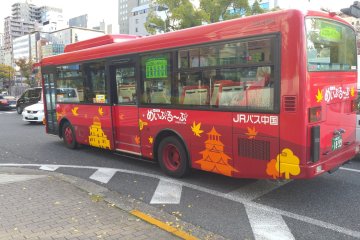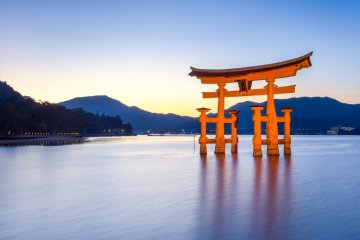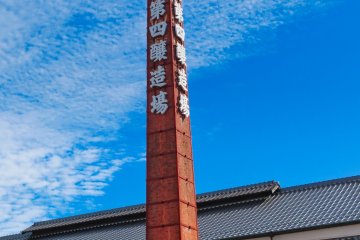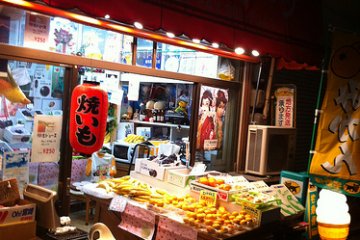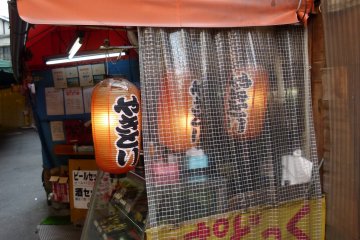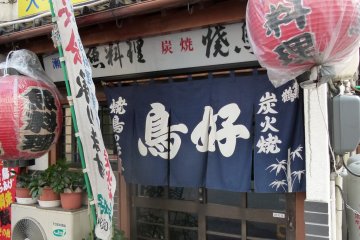If you are intrigued by Japanese shops of the past which may be run-down, but are charming all the same as they are staffed by shop-keepers who represent a part of Hiroshima's history you won't find in any guide book- you will appreciate a stroll around the area in front of Hiroshima station.
Some refer to areas like this as "wabi-sabi" a way to remember old Japan as it once was. The streets of this market are lined with seemingly insignificant shops that may not sell anything you particularly want or need, but date back to before the days of giant supermarkets and 7-11's on every corner. Knowing the history of Hiroshima and the courage of these people who still work here- as they lived through the destruction and helped rebuild the city- makes you appreciate these areas all the more.
Although many Hiroshima residents don't appreciate the value of maintaining old areas like this, it is great to see this area still alive. So many areas like this have been knocked down in the last 10 years. For example, the area around the Shinkansen side of Hiroshima station had a similar area called Wakakusa which is sadly gone. Many of the stalls in this Ekimae station area have been an important part of this community for over 50 years.
Once you wander into the narrow streets, you will notice old-style convenience stores, busy fishmongers, florists, vegetable shops and other interesting stalls you won't see anywhere else. We love the Nori seaweed and dried fish stall, the bean and seed seller (azuki, sesame, etc.) and the snack shop packed full of old-time Ame sweets and Okashi snack favorites- no chocolate to be seen anywhere! I love the old style posters on the walls of this retro shop- it reminds of an innocent age of the soda-drinking, wholesome pop icons long lost.
At the Yasai-ya produce stall, there is a hand-written poster I appreciated with all the names of the Japanese vegetables written in English on it. This is a fun place to take pictures if you are interested in the huge variety of the catch of the day or to grab fresh fish or a prepared plate of sashimi (cut raw fish) for dinner.
Although this area is a virtual ghost town on holidays and weekend afternoons, if you visit the marketplace on a weekday morning- you will catch it in all of its atmospheric glory. In the evening, it completely changes character as the Snack bars and Izakaya pubs open, basking the narrow streets in a red glow from their lanterns.
There is an especially lively feel to the place on home game days at the nearby Mazda Zoom Zoom baseball stadium. On these days, you will see sports fans picking up drinks and food on their way to and from the game.
Not only are the shopkeepers friendly and interesting (they have really seen it all), but the patrons are also a part of the experience. I eavesdropped on 2 mature ladies discussing what kind of fish to buy for dinner as they leaned into the fish cooler fondling all the different varieties. One lady complained about her husband while the other made sympathetic noises and suggested different recipes she could try.
This is not a typical tourist market, you will not find any "Japanese souvenirs" to take back home, the whole place is run down and rather lackluster yet completely charming in its own right. If you are looking for a cheap bite to eat, there are popular yaki-tori grilled chicken, horumon intestines, udon, soba and ramen noodles as well as donburi rice dishes. There are quite a few Japanese style Izakaya pubs which specialize in regional dishes like Hiroshima Kaki oysters and across the street is the 100 yen freshly squeezed juice and fruit stand Tamura.
We dread the day this area is wiped out too, but there are imminent plans to concrete over the area across the street. So, before that area is destroyed, wander across the tram line to the other side of the street where the Wabi-sabi experience continues. Stop in at one of the eccentric Kissaten coffee shops for a giant toast set or Teishoku meal. Or, if there is space, squeeze into the tiny nook of a soba shop next to the shoe shop called Dai-Koku-Ya for delicious noodles made by a 50+ year veteran of the area.
Up the block, next to the river, there are more recent additions to the area- popular Japanese pub Hama-ken is a favorite for grilled oysters and other local specialties which the tiny Ramen shop next to it has a loyal following.




